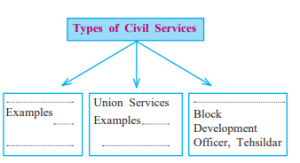Questions Answers For All Chapters – Civics Class 8
Bureaucracy
Q 1. Identify if the following statements are correct or wrong and rewrite the wrong sentences in their correct form.
(1) In a parliamentary democracy, representatives elected by people and ministers bear the administrative responsibility.
Answer: Correct – In a parliamentary democracy, elected representatives and ministers are responsible for administration.
(2) Union Public Service Commission (UPSC) recruits candidates for civil services in Maharashtra.
Answer: Wrong – The correct sentence is: Maharashtra Public Service Commission (MPSC) recruits candidates for civil services in Maharashtra.
Q 2. Explain the following statements with reasons.
(1) Reservation policy is followed even in civil services.
Answer: The reservation policy is followed to ensure that weaker sections of society such as Scheduled Castes, Scheduled Tribes, Other Backward Castes, women, and specially-abled individuals have equal opportunities in civil services. This helps reduce social inequality and increase representation of marginalized groups in the administration.
(2) It is necessary for civil servants to be politically neutral.
Answer: Political neutrality ensures that civil servants implement government policies efficiently, regardless of which political party is in power. It prevents bias and ensures that the administration remains stable and professional, even when governments change.
Q 3. Answer the following in 25-30 words.
(1) Explain the role of the ministers and civil servants in the efficient administration of the department.
Answer: Ministers make policy decisions and provide political leadership, while civil servants give expert advice, ensure smooth functioning, and implement policies efficiently. Mutual trust enhances departmental efficiency.
(2) Explain how the bureaucracy provides stability to the political system.
Answer: Bureaucracy ensures continuous provision of essential services like water supply, health, and transport. It implements government policies consistently, bringing stability and social change.
Q 4. Complete the Concept picture.
Answer:
Types of Civil Services
1. All India Services
- Examples: Indian Administrative Service (IAS), Indian Police Service (IPS)
2. Union Services
- Examples: Indian Foreign Service (IFS), Indian Revenue Service (IRS)
3. State Services
- Examples: Block Development Officer (BDO), Tehsildar
Q 5. Discuss characteristics of bureaucracy.
Answer:
- Permanent Mechanism – Bureaucracy ensures continuity in administration even when governments change.
- Political Neutrality – Civil servants implement policies without political bias.
- Anonymity – Civil servants work behind the scenes; ministers bear responsibility for success or failure.
- Expertise and Efficiency – Bureaucracy provides expert advice and efficient execution of policies.
- Accountability – Ministers are held accountable to the Parliament for the functioning of the departments under them.


Leave a Reply